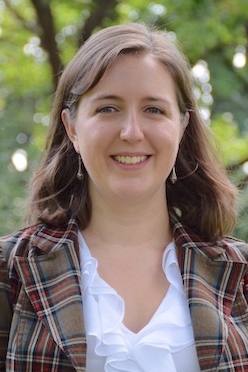New faculty focus: Claudia Persico

Claudia Persico, assistant professor in the Department of Educational Leadership and Policy Analysis • Hometown: Kinnelon, New Jersey • Educational/ professional background: BA in biology, Boston University, 2004; Ph.D. in human development and social policy, Northwestern University, 2016. • Previous position: Research assistant/coordinator, Department of Anatomy and Neurobiology, Boston University School of Medicine
Q&A
How did you get into your field of research? I’ve been interested in the causes of autism and learning disabilities for a long time. Previously, I worked as a neuroscientist investigating the neurobiology of autism at the Boston University School of Medicine. After spending some time working and volunteering for nonprofits in Chicago, I decided to switch to social policy because I was amazed by the profound inequality I had witnessed. I became interested in why so many low income children perform so much worse than their higher income peers and are more likely to have learning disabilities. Since then, my background as a neuroscientist has been wedded to health and education policy research. My research focuses on how exposure to environmental toxicants can cause inequality before children are even born, as well as how school resources impact long term outcomes.
What attracted you to UW–Madison? UW-Madison emphasizes and supports interdisciplinary and multidisciplinary research, which is something I’m very passionate about. There are great collaborations happening across departments and different fields of study at the university that promise to shed light on some very important topics. In addition, UW–Madison is well known for excellence in the social and biological sciences (among other things).
What was your first visit to campus like? I found the people in my department to be incredibly welcoming and kind. They seem to love it here and I’m excited to be joining them!
Favorite place on campus? The Terrace.
What are you most enjoying so far about working here? The people here are great. Everyone does such interesting work and has been very welcoming.
Do you feel your work relates in any way to the Wisconsin Idea? I hope that my research will shed light on how local sources of pollution can contribute to children’s unequal life chances before (they) are even born. By identifying pollution as a source of the black-white, rich-poor and other achievement gaps, we can start to address the problems that create these inequalities, thus improving the life chances of low income children in Wisconsin and nationwide. In addition, my other work informs the policy debate about school funding by uncovering how school resources matter to long-term outcomes like wages and educational attainment.
What’s something interesting about your area of expertise you can share that will make us sound smarter at parties? Although industrial plants exist in every major city of the United States releasing billions of pounds of toxic substances annually, there is little evidence about how and when these pollutants might harm child development. In 2014, Toxic Release Inventory (TRI) sites alone (which represent only one type of industrial plant) released 3.95 billion pounds of (untreated) toxic chemicals in America into the air, land and water, out of 25.45 billion total pounds of toxic chemicals created in production-related wastes.
Hobbies/other interests: I love making and listening to music, and reading science fiction novels.
Tags: faculty
